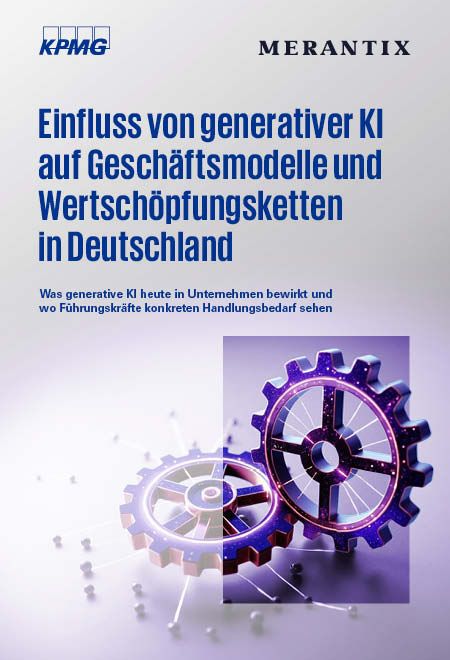72 per cent of the companies surveyed see increasing innovation as one of the five biggest advantages of AI. This clearly shows that the technology is becoming a strategic driver of competitiveness and growth in the German economy.
The study, "Influence of generative AI on business models and value chains in Germany" by KPMG and the leading European AI group Merantix, provides a comprehensive insight into the current status of AI use in companies. It sheds light on how generative AI is embedded in business models, what infrastructural prerequisites are being created and how organisations are preparing their employees to deal with intelligent systems.

Download the german study now
Influence of generative AI on business models and value chains in Germany
Download nowGaps between ambition and implementation
A clear trend emerges: companies that apply generative AI specifically to concrete business problems create structural advantages for themselves. At the same time, the study reveals gaps between strategic ambition and operational implementation. It therefore provides valuable pointers for managers who want to make their organisation fit for the future and fully exploit the potential of the technology.
Three key findings of the study are:
1. AI is strategically set, but not yet deeply anchored operationally
Practically all companies see AI as strategically relevant, but only 22 per cent have a robust governance structure. Many companies have not yet managed to effectively anchor AI technologies throughout the organisation. This is why teams with combined business and technology expertise are needed.
2. Dependence on US hyperscalers remains a risk
90 per cent see technology partnerships as a key success factor for their AI strategy. At the same time, a strong dependence on a few US hyperscalers increases strategic vulnerability. European alternatives and open platform structures that focus on shared responsibility rather than pure vendor loyalty are therefore in demand.
3. Expertise determines scaling
Without targeted employee training, AI initiatives will fail to have the desired effect in many places. AI expertise needs more than just tool training: it's about data-driven thinking, responsibility in dealing with AI and active human-machine collaboration.
Competitiveness comes from strategic scaling
Whether in the operational business, in the IT infrastructure or in building expertise: in addition to the hype, AI is now also an imperative. Find out in this study, for which we asked 653 executives for their assessments of how AI is already being used in the German economy. Find out where your company stands in comparison and receive tips on possible next steps.
Contact
Benedikt Höck
Partner, Head of AI, Strategy and Management Consulting
KPMG AG Wirtschaftsprüfungsgesellschaft
Ashish Madan
Managing Partner, CTO, Head of Technology Services
KPMG AG Wirtschaftsprüfungsgesellschaft




